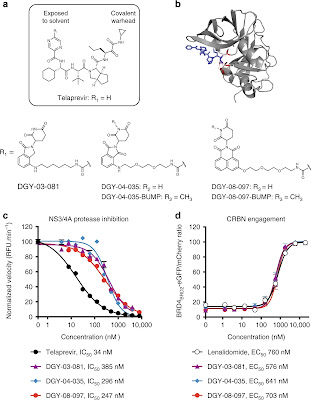Mélissanne de Wispelaere, Guangyan Du, Katherine A. Donovan, Tinghu Zhang, Nicholas A. Eleuteri, Jingting C. Yuan, Joann Kalabathula, Radosław P. Nowak, Eric S. Fischer, Nathanael S. Gray & Priscilla L. Yang
Nature Communications, 2019, 10, 3468
doi: 10.1038/s41467-019-11429-w
Targeted protein degradation is a promising drug development paradigm. Here we leverage this strategy to develop a new class of small molecule antivirals that induce proteasomal degradation of viral proteins. Telaprevir, a reversible-covalent inhibitor that binds to the hepatitis C virus (HCV) protease active site is conjugated to ligands that recruit the CRL4CRBN ligase complex, yielding compounds that can both inhibit and induce the degradation of the HCV NS3/4A protease. An optimized degrader, DGY-08-097, potently inhibits HCV in a cellular infection model, and we demonstrate that protein degradation contributes to its antiviral activity. Finally, we show that this new class of antiviral agents can overcome viral variants that confer resistance to traditional enzymatic inhibitors such as telaprevir. Overall, our work provides proof-of-concept that targeted protein degradation may provide a new paradigm for the development of antivirals with superior resistance profiles.
A blog highlighting recent publications in the area of covalent modification of proteins, particularly relating to covalent-modifier drugs. @CovalentMod on Twitter, @covalentmod@mstdn.science on Mastodon, and @covalentmod.bsky.social on BlueSky
Discovery of a Potent, Selective, and In Vivo Efficacious Covalent Inhibitor for Lysine Methyltransferase SETD8
He Chen, Rudra Prasad Dutta, Zhizhong Li, Yue Zhong, Anqi Ma, Kwang-Su Park, Jithesh Kottur, Alison Park, Nicolas Babault, Ke Wang, Dandan W...
-
Design, synthesis and biological evaluation of the activity-based probes for FGFR covalent inhibitorDandan Zhu, Zijian Zheng, Huixin Huang, Xiaojuan Chen, Shuhong Zhang, Zhuchu Chen, Ting Liu, Guangyu Xu, Ying Fu, Yongheng Chen, European Jo...
-
DOI Ansgar Oberheide, Maxime van den Oetelaar, Jakob Scheele, Jan Borggräfe, Semmy Engelen, Michael Sattler, Christian Ottmann, ...
-
Nafizul Haque Kazi, Nikolas Klink, Kai Gallant, Gian-Marvin Kipka & Malte Gersch Nat Struct Mol Biol , 2025 https://doi.org/10.1038/s415...

